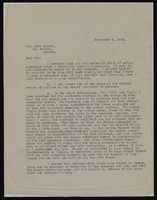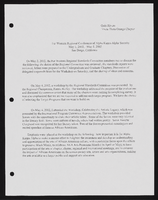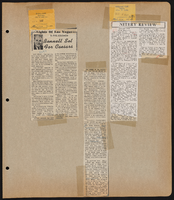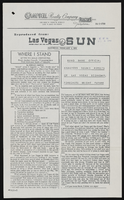Search the Special Collections and Archives Portal
Search Results

Correspondence, Thomas Toland to Levi Syphus
Date
Archival Collection
Description
Text

Alpha Kappa Alpha Sorority, Theta Theta Omega Chapter 73rd Far Western Regional conference agenda and report
Date
Archival Collection
Description
From the Alpha Kappa Alpha Sorority, Incorporated, Theta Theta Omega Chapter Records (MS-01014) -- Chapter records file.
Text

Alber A. Mora oral history interview: transcript
Date
Archival Collection
Description
Oral history interview with Alber A. Mora conducted by Rodrigo Vazquez and Laurents Bañuelos-Benitez on December 7, 2018 for the Latinx Voices of Southern Nevada Oral History Project. Alber Mora talks about his life growing up in Cuba with his family and the circumstances of their departure from the country; his brother faced pressures to join the military, which led the Mora family to immigrate to the United States by way of a fishing boat in 1994. Alber discusses the family's lives in Houston, Texas and how he met and married his wife, Rosemary, before the couple moved to Los Angeles and Alber began working at Porto's Bakery, a famous Cuban eatery in L.A. Alber shares how he and his wife eventually moved to Las Vegas, where he works for Caesar's Palace and for the Culinary Workers Union as a Shop Steward.
Text

Transcript of interview with Robert "Bob"Agonia by Marcela Rodriguez-Campo, September 6, 2018
Date
Archival Collection
Description
Robert “Bob” Agonia (1938- ) was born in Garden Grove, California on a migrant camp made up of Filipino and Mexican-American workers. Agonia’s father was a farmer on a 70 acre farm owned by the Beggs family. Agonia did not spend much time living on the migrant camp, as his father moved the family to a private residence when Agonia was four. Agonia attended school, during an era of school desegregation in Garden Grove. He recalls that his mother dealt with segregation during her schooling, being forced to attend a school miles down the road from her home despite living across the street from another school. Agonia recalls his community being very diverse with families sharing Filipino and Mexican-American heritage and his neighbors being Japanese Americans. Agonia participated in a multicultural Boy Scout troop. After high school, Agonia joined the Peace Corps and served in El Salvador. While there, Agonia worked in an agricultural research center in Santa Tecla where he helped local farmers select the proper insecticide for their crops. After the Peace Corps, Agonia had his choice of government jobs, ultimately selecting to work for the Internal Revenue Service. Agonia’s work with the IRS is what eventually brought him from California to Las Vegas. He quickly realized that the type of IRS cases he would be handling in Las Vegas were completely different from the work he was accustomed to in California. One of those unique cases required him to close the doors of a downtown casino. Since moving to Las Vegas, Agonia was critical in establishing a Las Vegas LULAC chapter, an American GI Forum, an EEO council, and the UNLV Engineering school.
Text

Nathalie Martinez oral history interview: transcript
Date
Archival Collection
Description
Oral history interview with Nathalie Martinez conducted by Rodrigo Vazquez and Barbara Tabach on June 24, 2021 for Latinx Voices of Southern Nevada Oral History Project. Nathalie Martinez, one of the original members of the Latinx Voices project team, dicusses her personal history and the history of her parents who immigrated to the United States from Colombia and El Salvador. She shares her educational background and experiences working as an interviewer for the Latinx Voices project before its culmination and her graduation in 2021. Nathalie also talks about her work on the project's podcast and her work linguistically translating the interviews from Spanish to English.
Text

Astrid Silva oral history interview: transcript
Date
Archival Collection
Description
Oral history interview with Astrid Silva conducted by Monserrath Hernández and Barbara Tabach on April 22, 2019 for the Latinx Voices of Southern Nevada Oral History Project. Astrid Silva was born in Gomez Palacio, Durango in 1988. She immigrated with her mother to the United States in 1992, where they were met by her father before flying to Los Angeles. She recounts her first impression of the United States and her families eventual move to Las Vegas, where she describes her time living in Las Vegas' west side and struggles she faced being an undocumented student living in Las Vegas. She describes her first meeting with Senator Harry Reid and the friendship that developed afterwards. She has spoken at the Democratic National Convention and has been vocal about her status as a Dreamer. She is currently the Executive Director for DREAM Big Nevada which was established in 2017 in order to provide aid to Nevada's immigrant families. She writes about her hopes for Dreamers and her continued work in expanding the ways that immigrant families can be helped in an always changing political climate. Subjects discussed include: DACA, Dreamers, Immigrant Rights, and Higher Education.
Text
University of Nevada, Las Vegas Lied Library Architectural Records
Identifier
Abstract
The University of Nevada, Las Vegas Lied Library Architectural Records (1965-2010) are comprised of drawings and documents created by the American architecture firms of Welles Pugsley Architects and Leo A Daly Architects, as well as their associated consultants, engineers, and other professional collaborators. This collection documents the design and construction of Lied Library at the University of Nevada, Las Vegas (UNLV). The materials feature both hand-drawn and computer generated architectural drawings, ranging from preliminary sketches and artist renderings to schematic drawings and construction documents.
Archival Collection

Transcript of interview with Ernest Jackson Jr. by Larry E. Cooper, March 1, 1980
Date
Archival Collection
Description
On March 1, 1980, Larry E. Cooper interviewed general contractor Ernest (Ernie) Jackson Junior (born December 6th, 1932 in Bruce, Mississippi) in Cooper’s home about his experiences in the Westside as a Black Las Vegas resident. Jackson Jr. discusses the lack of property buyers on the Westside and his goals of improving the Westside by building on the land. Jackson Jr. also discusses his youth as a baseball star for Las Vegas High School in the fifties.
Text


